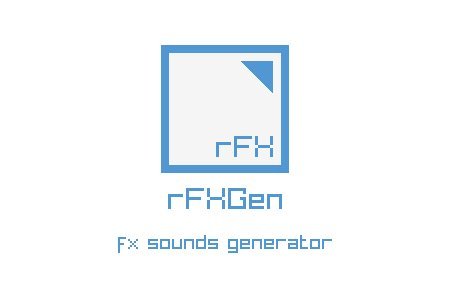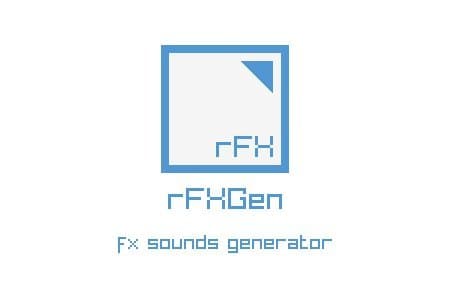A modern revival of Dr. Petter's legendary sfxr algorithm, rFXGen offers developers a free, cross-platform solution for procedural sound generation. This open-source tool bridges retro aesthetics with contemporary workflows, featuring WebAssembly accessibility, standalone applications, and seamless export options for game development and beyond.
rFXGen: Reviving Retro Sound Design with Modern Open-Source Tooling
In the fast-paced world of game development and interactive media, sound design often becomes an afterthought—until a project needs that perfect blip, explosion, or ambient hum. Enter rFXGen, a contemporary reimagining of Dr. Petter's seminal sfxr algorithm, now packaged as a free, open-source toolkit for developers seeking efficient procedural sound generation. Born from the raylib technologies ecosystem, this tool marries retro-inspired synthesis with modern accessibility, offering both browser-based convenience and standalone power.
The sfxr Legacy Reimagined
At its core, rFXGen inherits the algorithmic DNA of sfxr, a 2007 tool that revolutionized indie game audio by generating authentic 8-bit-style sounds through randomized parameters. This approach allowed solo developers to create entire sound libraries without specialized audio expertise or costly software. rFXGen preserves this philosophy while enhancing it with modern interfaces and export capabilities.
"This is super nice! Is there a way to embed the core of this tool in a Raylib project, to generate the sound effects on the fly?"
— Developer Community Feedback
The tool's interface deconstructs sound generation into intuitive parameters: frequency modulation, envelope shaping (attack/decay/sustain/release), noise components, and distortion controls. Through sliders and randomized generation buttons, developers can craft everything from classic arcade sounds to futuristic sci-fi effects—all within a clean, responsive UI.

The rFXGen interface, showcasing its parameter-driven sound synthesis capabilities.
Cross-Platform Accessibility and Workflow Integration
rFXGen addresses modern development needs through multi-format deployment:
- WebAssembly Edition: A browser-based version requiring no installation, ideal for rapid prototyping and cross-platform accessibility.
- Standalone Applications: Native binaries for Windows and Linux with extended features like command-line support for batch processing and audio playback.
- Export Flexibility: Generated sounds can be saved as
.rfxparameter files for later replication, or exported to.wav(standard audio),.raw(sample data), and.h(C/C++ byte arrays for direct code embedding).
The .h export format is particularly noteworthy, enabling developers to compile sound assets directly into their applications—a critical feature for resource-constrained environments like embedded systems or retro gaming emulators.
"sonar.prochijack!g47 threat notification with Norton AV-- removed my exe several times"
— User Security Concern
Open-Source Collaboration and Community-Driven Evolution
Licensed under the permissive zlib/libpng license, rFXGen embodies open-source best practices. The source code is publicly available on GitHub, inviting scrutiny, contribution, and customization. This transparency has fostered a vibrant community where users report issues, suggest features, and even provide solutions.
User feedback has driven significant improvements:
- Linux Compatibility: Initial GLIBC version errors were resolved through community collaboration and recompilation efforts.
- High-DPI Support: Scaling issues on modern displays were addressed with keyboard shortcuts (LCTRL+F for 200% UI scaling).
- Platform Expansion: Native Linux binaries were added after persistent user requests.
"I'd be happy to pay few bucks for Linux version :)"
— User Feature Request
Technical Nuances and Integration Potential
For developers seeking deeper integration, rFXGen's modular architecture allows embedding the core synthesis engine directly into projects. The GitHub repository exposes the waveform generation code, enabling on-the-fly sound creation within applications like Raylib-based games.
// Example of embedded sound generation in C/C++
// (Conceptual - actual implementation depends on project)
#include "rfxgen.h"
void generate_explosion_sound() {
RFXGenConfig config = {
.type = NOISE,
.duration = 0.5f,
.attack = 0.1f,
.sustain = 0.3f,
.release = 0.1f
};
uint8_t* sound_data = rfxgen_generate(&config);
// Play or embed sound_data in game engine
}
Challenges and the Road Ahead
Despite its strengths, rFXGen faces typical open-source tooling challenges:
- Platform Fragmentation: Wayland/Nvidia compatibility issues and Windows permission quirks remain active areas of investigation.
- Export Consistency: Some users report discrepancies between editor previews and exported
.wavfiles, highlighting the complexity of audio rendering. - Documentation Gap: While the code is open, comprehensive API documentation could lower barriers for integration-focused developers.
"It freezes on Arch Linux after the last update lol.... I'll try to recompile it next week... It should be ok now. :)"
— Developer Response to Bug Report
The Future of Procedural Audio
rFXGen represents more than just a sound generator—it's a testament to the enduring value of algorithmic audio in an era dominated by sample-based libraries. Its blend of accessibility, technical transparency, and community-driven development makes it an invaluable tool for indie developers, educators, and audio experimenters.
As the project evolves, potential enhancements could include VST/AU plugin integration, advanced waveform modulation, and collaborative sound-sharing platforms. For now, rFXGen stands as a powerful reminder that sometimes the most innovative solutions come not from complex commercial suites, but from elegant algorithms shared freely with the development community.
In a landscape where middleware costs can spiral, tools like rFXGen democratize sound design—ensuring that even solo creators can craft audio experiences that resonate as deeply as their visual counterparts.

Comments
Please log in or register to join the discussion